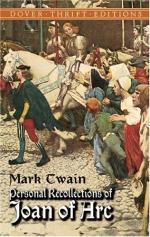Consider some of the things it charges against her, and remember who it is it is speaking of. It calls her a sorceress, a false prophet, an invoker and companion of evil spirits, a dealer in magic, a person ignorant of the Catholic faith, a schismatic; she is sacrilegious, an idolater, an apostate, a blasphemer of God and His saints, scandalous, seditious, a disturber of the peace; she incites men to war, and to the spilling of human blood; she discards the decencies and proprieties of her sex, irreverently assuming the dress of a man and the vocation of a soldier; she beguiles both princes and people; she usurps divine honors, and has caused herself to be adored and venerated, offering her hands and her vestments to be kissed.
There it is—every fact of her life distorted, perverted, reversed. As a child she had loved the fairies, she had spoken a pitying word for them when they were banished from their home, she had played under their tree and around their fountain—hence she was a comrade of evil spirits.
She had lifted France out of the mud and moved her to strike for freedom, and led her to victory after victory—hence she was a disturber of the peace—as indeed she was, and a provoker of war—as indeed she was again! and France will be proud of it and grateful for it for many a century to come. And she had been adored—as if she could help that, poor thing, or was in any way to blame for it. The cowed veteran and the wavering recruit had drunk the spirit of war from her eyes and touched her sword with theirs and moved forward invincible—hence she was a sorceress.
And so the document went on, detail by detail, turning these waters of life to poison, this gold to dross, these proofs of a noble and beautiful life to evidences of a foul and odious one.
Of course, the sixty-six articles were just a rehash of the things which had come up in the course of the previous trials, so I will touch upon this new trial but lightly. In fact, Joan went but little into detail herself, usually merely saying, “That is not true—passez outre”; or, “I have answered that before—let the clerk read it in his record,” or saying some other brief thing.
She refused to have her mission examined and tried by the earthly Church. The refusal was taken note of.
She denied the accusation of idolatry and that she had sought men’s homage. She said:
“If any kissed my hands and my vestments it was not by my desire, and I did what I could to prevent it.”
She had the pluck to say to that deadly tribunal that she did not know the fairies to be evil beings. She knew it was a perilous thing to say, but it was not in her nature to speak anything but the truth when she spoke at all. Danger had no weight with her in such things. Note was taken of her remark.
She refused, as always before, when asked if she would put off the male attire if she were given permission to commune. And she added this:




